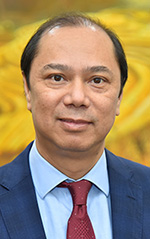Peace, Cooperation, and Global Progress: 30 Years of Vietnam-U.S. Diplomacy
The Vietnam-U.S. relationship shows that reconciliation and cooperation can overcome even the most profound historical challenges.
BY H.E. NGUYEN QUOC DZUNG
The relationship between Vietnam and the United States has navigated numerous historical challenges while achieving remarkable progress over the past 30 years since the normalization of diplomatic relations on July 11, 1995. The two countries have reached significant milestones, including the establishment of the Comprehensive Partnership in 2013 and its elevation to a Comprehensive Strategic Partnership in 2023. The Vietnam-U.S. relationship serves as a powerful testament to the spirit of reconciliation and healing between the two nations, exemplifying a model for promoting peace and cooperation in the future.
From Adversaries to Strategic Partners
The history of Vietnam-U.S. relations can be traced back over two centuries, marked by early diplomatic exchanges despite geographical and communication barriers. President Thomas Jefferson expressed interest in Vietnamese rice, and subsequently, American trading ships sought to establish cooperation with Vietnam. During World War II, the Việt Minh, led by Hồ Chí Minh, assisted stranded U.S. pilots, demonstrating goodwill between the two nations. Following Vietnam’s declaration of independence in 1945, President Hồ Chí Minh sent 14 letters to U.S. leaders seeking full cooperation.
However, historical challenges led to prolonged hostilities, resulting in significant losses for both countries. Vietnam suffered the loss of more than 3 million lives and continues to grapple with the lasting legacies of war, such as the effects of Agent Orange. Meanwhile, the U.S. lost 58,000 soldiers, with many veterans facing long-term trauma as a result of their experiences.
The war ended in April 1975; however, the domestic and international conditions were not yet conducive for our two countries to begin the healing process. Hostility, resentment, and suspicion lingered on both sides for many years, resulting in numerous missed opportunities. Sanctions and economic embargoes imposed by the United States and its allies plunged Vietnam into hardship, further deepening the divide between our nations.
Despite this challenging backdrop, early efforts emerged on both sides to lay the groundwork for improved bilateral ties, particularly in addressing war legacies and humanitarian issues. Ultimately, these efforts culminated in a historic breakthrough that set our countries on a path toward reconciliation and partnership. On July 11, 1995, Prime Minister Võ Văn Kiệt and President Bill Clinton officially announced the normalization of diplomatic relations, marking the beginning of a new chapter in Vietnam-U.S. relations.
From that point onward, the Vietnam-U.S. partnership flourished, rising from height to greater height. In 2000 and 2005, President Bill Clinton and Prime Minister Phan Văn Khải made history as the first leaders of their respective countries to visit each other since the war. In July 2013, President Trương Tấn Sang visited the United States and, alongside President Barack Obama, announced the establishment of the Vietnam-U.S. Comprehensive Partnership.
Both Vietnam and the United States have demonstrated a commitment to healing the wounds of war, overcoming the past.
In 2017 President Donald Trump highlighted the remarkable progress in Vietnam-U.S. bilateral relations, stating: “The United States and Vietnam have come a long way. We’ve seen it from both sides of the picture, and this is the pleasant side.” In September 2023, as our two countries celebrated the 10th anniversary of the Comprehensive Partnership, President Joe Biden visited Vietnam. Together with the late General Secretary Nguyễn Phú Trọng, they elevated our relationship to a Comprehensive Strategic Partnership for peace, cooperation, and development. Biden emphasized that no one could have imagined a day when a U.S. president would stand alongside Vietnamese leaders in Hanoi to announce such a partnership.
Today, the United States is Vietnam’s largest export market, with bilateral trade increasing more than 250-fold since the normalization of relations. U.S. businesses recognize Vietnam’s potential and are continuously expanding their investments, particularly in high-tech industries, emerging sectors, and renewable energy. Meanwhile, an increasing number of Vietnamese businesses are also investing in the United States.
In the areas of politics and security, cooperation between Vietnam and the United States has been increasingly strengthened by addressing key issues in bilateral relations, responding to climate change, and supporting regional initiatives within the Association of Southeast Asian Nations (ASEAN) framework and Mekong cooperation. In education and people-to-people exchanges, Vietnam leads Southeast Asia in the number of students studying in the United States, with more than 30,000 Vietnamese students enrolled. Additionally, many U.S. universities have established research programs focused on Vietnam, contributing to a deeper American understanding of Vietnamese culture and history.
The journey from former adversaries to comprehensive strategic partners is a powerful testament to the value of peace in today’s world. This process of reconciliation and cooperation demonstrates that nothing is impossible when both sides exhibit determination, goodwill, and shared objectives to foster a sustainable and forward-looking relationship.
Drivers for the Relationship
The robust growth of Vietnam-U.S. relations has been propelled by a number of factors. First, the trend of international integration following the Cold War created opportunities for the two countries to redefine their relationship. The development of bilateral ties since normalization aligns with this broader global trend. As nations increasingly prioritize economic cooperation and stability, both Vietnam and the United States recognize the strategic benefits of enhancing their bilateral relations. This shift has opened avenues for both sides to overcome historical barriers, strengthen ties, and pursue a shared future.
Another critical factor is the concerted effort to address war legacies. Both Vietnam and the United States have demonstrated a commitment to healing the wounds of war, overcoming the past, and strengthening ties between their peoples. Cooperative programs focused on Agent Orange remediation, unexploded ordnance clearance, and the search for missing soldiers have played a significant role in building mutual trust. These initiatives not only address humanitarian concerns but also convey a strong message of long-term commitment to improving bilateral relations.
Vietnam’s remarkable socioeconomic growth over the past three decades has been an important driver of bilateral relations.
At the same time, Vietnam’s remarkable socioeconomic growth over the past three decades has been an important driver of bilateral relations. Transitioning from an economy primarily based on agriculture, Vietnam has evolved into a major manufacturing and trade hub, its GDP increasing twentyfold. It now ranks 35th among the world’s largest economies and is among the top 20 trading nations. With its independent, self-reliant, and diversified foreign policy, Vietnam has established diplomatic relations with 194 countries. These achievements not only affirm Vietnam’s stature, capabilities, and growing influence but also attract interest from major powers, including the United States, in fostering bilateral relations.
Further, the role of high-level leadership, government agencies, local authorities, and business communities in both countries has been crucial in advancing bilateral relations. Upgrading ties to a Comprehensive Strategic Partnership in September 2023 ushered in a new era characterized by greater depth and scope to meet the aspirations of both nations. This framework reflects the strong commitment of both leaderships to enhancing cooperation across all sectors and establishes clear mechanisms for implementation. As a result, Vietnam-U.S. relations have inspired confidence and motivation for organizations, businesses, and individuals on both sides to engage more actively in collaborative efforts.
A New Era of Development
Entering a new era, Vietnam-U.S. relations are poised to expand comprehensively and deeply. With the solid foundation established over the past three decades, both countries now have the opportunity to enhance strategic and comprehensive cooperation across multiple fields, including diplomacy, politics, economics, trade, investment, education, security, and environmental protection. This broadening of collaboration is expected to strengthen ties further and promote mutual benefits, paving the way for a prosperous future for both nations.
One of the most important breakthroughs in the Vietnam-U.S. Comprehensive Strategic Partnership is the cooperation in science, technology, and innovation, particularly in artificial intelligence (AI) and semiconductors. Vietnam’s burgeoning digital economy presents vast opportunities, and U.S. expertise can significantly support its integration into global value chains. Notably, major U.S. tech firms are expanding their investments in Vietnam, fostering advancements in AI development and semiconductor manufacturing. This collaboration will enhance Vietnam’s technological capabilities, attract high-tech investment, and position the country as a player in global supply chains. Vietnam is also eager to collaborate with American companies to ensure its energy security and facilitate the transition to sustainable energy sources.
In the realm of security, both nations share common interests in maintaining peace, stability, and the rule of law in the Indo-Pacific region. Challenges such as cybersecurity threats and regional security issues necessitate close bilateral and multilateral coordination. Collaborative efforts through ASEAN, the Mekong-U.S. Partnership, and other initiatives will further consolidate Vietnam-U.S. relations.
Overcoming differences is a natural part of any bilateral relationship. However, with strong commitment, goodwill, and adherence to international law, along with mutual respect for sovereignty and noninterference, both sides will continue to navigate challenges and further strengthen their cooperation. People-to-people ties, cultural exchanges, and educational programs will play a vital role in fostering deep mutual understanding, ensuring that Vietnam-U.S. relations remain resilient and enduring. This solid foundation will support the continued sustainable development of Vietnam-U.S. relations, aiding Vietnam as it steps into a new era of growth and advancement.
In a world of constant change, 30 years of diplomatic relations between Vietnam and the United States have shown that reconciliation and cooperation can overcome even the most profound historical challenges. Looking ahead, the two nations are not only strategic partners but also trusted companions, working together to create greater value for the region and the world. With strong determination and commitment from both sides, the Vietnam-U.S. relationship will continue to play a vital role in promoting peace, prosperity, and stability both regionally and globally. This enduring partnership is poised to address contemporary challenges and seize new opportunities for mutual benefit.
When sharing or linking to FSJ articles online, which we welcome and encourage, please be sure to cite the magazine (The Foreign Service Journal) and the month and year of publication. Please check the permissions page for further details.
Read More...
- On the Foreign Service in Vietnam, Online Supplement to the April 2015 Issue of The Foreign Service Journal
- “The Value of Talent and Determination: A Conversation with Ambassador Dzung, Vietnam’s Ambassador to the United States,” Diplomacy and Science, December 2023
- “President of Vietnam, H.E. To Lam, on the 30th Anniversary of U.S.-Vietnam Relations,” Asia Society, September 2024



